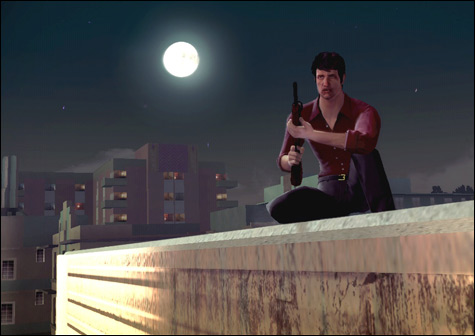
AMPLIFIED THUGGERY Okay, so it's not the movie — but it's not a very good game, either. |
| The Godfather II | For Xbox 360 and PlayStation 3 | Rated M for Mature | Developed by EA Redwood Shores | Published by Electronic Arts |
Anyone who watches the Godfather movies and comes away thinking that a life in organized crime sounds pretty neat probably needs to see them again. That would include the folks behind The Godfather II, the video game, who seem to think that the films are about how awesome it is to whack guys and get rich. This might be a reasonable interpretation of some gangster films — there's a healthy trade in Scarface T-shirts, if rap videos are any indication — but it's a sorely misguided take on one of the great American tragedies. If adapting the Godfather series means stripping it of subtext and amplifying the thuggery, that may be the greatest imaginable indictment of video games as a medium.The Godfather II loosely follows the plot of the second film, though in a bizarre bit of ret-conning, your playable character — an up-and-coming mafioso named Dominic — is shoehorned into every major plot point. If you're like me and you opted to give Dominic a beard and an Afro at the character-creation screen, then you have to accept this freaked-out beatnik talking shop with guys like Tom Hagen and Hyman Roth. But the more general problem is the way the game over-explains everything, destroying the film's subtleties with the bludgeon of the amateur storyteller. The opening cutscene lets you know what you're in for: upon spying Fredo Corleone for the first time, Dominic's eyes narrow. At least they didn't have Fredo cackle and curl his moustache.

As for gameplay, The Godfather II has some nice ideas. Although your minute-to-minute experience is a third-person, open-world affair, you can at any time access the "Don's view," a top-down map screen that shows every establishment in the city with mob connections. Using this screen, you can order your soldiers to defend your businesses, scout attacks on rival families, and manage your capos and enforcers. Owning specific crime rings accords your crew stat bonuses and increases your cash flow. The menus in the Don's view are a bit tricky to navigate — there's a lot of information packed into a small space — but this layer of strategy is the game's best feature.
The ground-level portions are far weaker. It's just like playing Grand Theft Auto IV, except the cities are small and empty and there's nothing to do. There is some variation — The Godfather II ferries you among New York, Miami, and Cuba, which are visually distinct, if equally boring. The bulk of the gameplay consists of raids on businesses belonging to rival families, and they all play out in similar fashion. You and your crew bust into the facility — sometimes by dynamiting a wall or cutting through a fence — and then blast away. The shoot-outs are easy, thanks to lock-on targeting, and there's no sense of flow or progression through each attack.
The rough edges make it impossible to appreciate the few things the game does well. Bugs are common, as when you find two cars occupying the same physical space, or one of your crew members starts running in circles. Dominic can fall off roofs without taking any damage, or even breaking stride. He acquires crucial information by interrogating random strangers on the street who happen to have little key-shaped icons floating above their heads. Through these and other miscues, The Godfather II keeps reminding you that you're only playing a game. It's like trying to read a book in which all the words are misspelled. Ironic that a game about mobsters would suffer from a failure of execution.
Read Mitch Krpata's blog at insultswordfighting.blogspot.com.